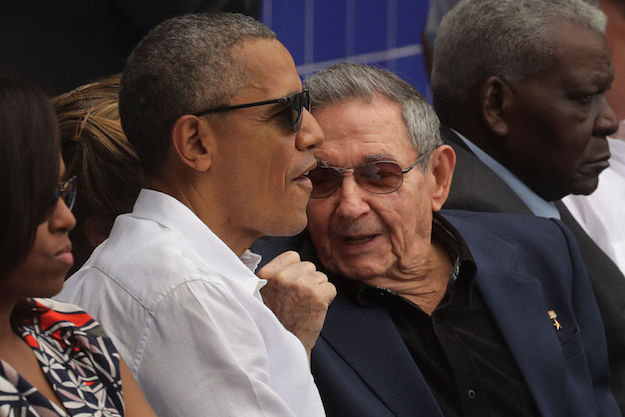The World as It Is, a meaty new memoir by Barack Obama confidant Ben Rhodes, makes for distressingly painful, occasionally inspiring reading. In Rhodes’ reflective narrative, the ugly partisan warfare of Washington repeatedly reduces talented, tireless, well-intentioned officials to tears. Reputations of good people are carelessly ravaged by hypocritical Republicans, hidden spinners of right-wing conspiracy theories, and a trivializing, jingoistic mainstream media. And we know how the story ends: the election of a vindictive successor, hell bent on undoing whatever good Obama had managed to accomplish.
Yet, in Rhodes’ own windowless West Wing world, a singular accomplishment stands out: normalization of diplomatic relations with Cuba. It’s the kind of historical achievement that justifies all the chronic pain.
In a departure from protocol, in 2013 Obama deputized Rhodes, a communications manager and speechwriter, to lead secretive diplomatic negotiations with the Cubans, assisted by only by a few White House Latin America hands. Fearing destructive leaks, the White House kept the State Department and intelligence community in the dark.
Some of what Rhodes writes is already public record, at least in broad-brush terms. Rhodes reports that Obama had long favored a revision of U.S. hostility toward Cuba, which he viewed as a relic of the Cold War. During the periodic Summits of the Americas, Obama had taken note of the persistent complaints about U.S. Cuba policy. (Oddly, Rhodes omits the first sustained face-to-face encounter between Obama and then-Cuban President Raúl Castro at the 2015 Panama Summit of the Americas.) Furthermore, the White House was aware that advocates for engagement were arguing that better bilateral relations might not only improve the standing of the U.S. in Latin America, but also catalyze liberalizing reforms on the island and fuel the nascent private sector there.
Rhodes confirms that the initial sticking point was the Cuban imprisonment of a USAID contractor, Alan Gross. For their part, the Cubans demanded the release of “The Cuban Five,” convicted spies serving long terms in U.S. prisons. Importantly, Rhodes also verifies that his Cuban counterpart was Alejandro Castro, Raúl’s son.
In response to critics claiming that Obama gave away too much without reciprocal concessions, Rhodes underscores that he extracted important pledges from the Cubans, beyond Gross’ freedom. The Cubans agreed to release over 50 political prisoners, undertake (mostly unspecified) political and economic reforms, open doors to U.S. business, and expand internet access. And, in two unprecedented concessions that the Cubans would live to regret, when Obama visited Havana they agreed to live uncensored TV coverage of his major address and to a joint press conference.
Beyond adding fascinating color to these known facts, Rhodes adds several juicy, newsworthy details. When his talks with the Cubans first began, the ultimate goals were unclear, at least on the U.S. side. Rhodes went to Obama and his national security adviser, Susan Rice, for further guidance. Rice urged “the big bang,” and Obama agreed, instructing his diplomats to “go big.” In Rhodes’ account, no formal decision-making, no bureaucratic paper trail, preceded this historic presidential fiat.
There’s also the shock of a surprise offer from the Cubans, who said they would take in the prisoners from Guantanamo if the U.S. gave back the naval base, which it has occupied since the Spanish-American War. Obama dismissed the proposal as “a bridge too far.”
The talks did yield much the two sides could agree on. Again, in Rhodes’ account it was the U.S. that first tabled the proposal to expand the secret talks from a spy swap to the much larger agenda of diplomatic normalization. But Alejandro Castro was quick to take up the offer, and apparently already empowered to do so. Alejandro placed the talks in historical perspective: Whereas tentative talks by previous administrations had faltered, the difference this time was the fact that “we have the political will of our leaders, Raúl Castro and Obama.”
Some accounts of the secret talks have placed the Vatican at center stage. In Rhodes’ narrative, Rome came late to the table. Pope Francis merely blessed the already cooked agreements – providing useful political cover for Obama among Catholic Cuban Americans.
Rhodes indicates that he was aware that Obama’s speech in Havana, which pushed hard on human rights and free markets – language calculated to please Cuban Americans – might backfire among Cuban officials. “We were pushing, I knew, too far, too fast. But we were saying what we believed, and sometimes that is all that you can do,” Rhodes writes. Even before Obama left Havana on Air Force One, official Cuban media had begun to push back against Obama’s messages. Internally, the Cubans placed their slow-motion reforms on pause, where they remain to this day.
The Obama administration placed a number of initiatives on the table that Cuban bureaucrats responded to with characteristic caution. The Cubans were excruciatingly slow to issue licenses to U.S. firms interested in doing business in Cuba, failed to open fluid channels for commerce with the Cuban private sector, and did not settle the outstanding property claims of U.S. citizens. Had the Cuban government engaged more energetically with these constituencies, they might have provided a counterweight to the Miami hardliners in Donald Trump’s political calculations. This Cuban caution illustrates one of the core themes of The World As It Is: Other nations pursue their own interests as they see them, resistant to the entreaties of even the most powerful nation on earth.
Overall, Rhodes is entitled to a bit of bragging: “We had done something big and right for its own reasons … This was as good as it gets.” History will record Rhodes’ home run, even if Trump’s unforced errors – a return to Cold War rhetoric, an unwarranted travel advisory, sharp reductions in embassy staff – have temporarily set back cross-straits relations.
—
Feinberg is the author of Open for Business: Building the New Cuban Economy (2016). A member of the AQ Editorial Board, Feinberg was present in Havana for former President Brack Obama’s historic 2016 visit.



